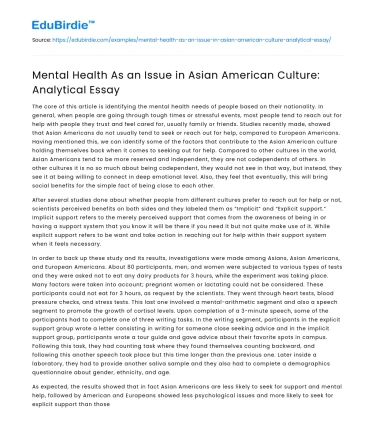The core of this article is identifying the mental health needs of people based on their nationality. In general, when people are going through tough times or stressful events, most people tend to reach out for help with people they trust and feel cared for, usually family or friends. Studies recently made, showed that Asian Americans do not usually tend to seek or reach out for help, compared to European Americans. Having mentioned this, we can identify some of the factors that contribute to the Asian American culture holding themselves back when it comes to seeking out for help. Compared to other cultures in the world, Asian Americans tend to be more reserved and independent, they are not codependents of others. In other cultures it is no so much about being codependent, they would not see in that way, but instead, they see it at being willing to connect in deep emotional level. Also, they feel that eventually, this will bring social benefits for the simple fact of being close to each other.
After several studies done about whether people from different cultures prefer to reach out for help or not, scientists perceived benefits on both sides and they labeled them as “Implicit” and “Explicit support.” Implicit support refers to the merely perceived support that comes from the awareness of being in or having a support system that you know it will be there if you need it but not quite make use of it. While explicit support refers to be want and take action in reaching out for help within their support system when it feels necessary.
Save your time!
We can take care of your essay
- Proper editing and formatting
- Free revision, title page, and bibliography
- Flexible prices and money-back guarantee
In order to back up these study and its results, investigations were made among Asians, Asian Americans, and European Americans. About 80 participants, men, and women were subjected to various types of tests and they were asked not to eat any dairy products for 3 hours, while the experiment was taking place. Many factors were taken into account; pregnant women or lactating could not be considered. These participants could not eat for 3 hours, as request by the scientists. They went through heart tests, blood pressure checks, and stress tests. This last one involved a mental-arithmetic segment and also a speech segment to promote the growth of cortisol levels. Upon completion of a 3-minute speech, some of the participants had to complete one of three writing tasks. In the writing segment, participants in the explicit support group wrote a letter consisting in writing for someone close seeking advice and in the implicit support group, participants wrote a tour guide and gave advice about their favorite spots in campus. Following this task, they had counting task where they found themselves counting backward, and following this another speech took place but this time longer than the previous one. Later inside a laboratory, they had to provide another saliva sample and they also had to complete a demographics questionnaire about gender, ethnicity, and age.
As expected, the results showed that in fact Asian Americans are less likely to seek for support and mental help, followed by American and Europeans showed less psychological issues and more likely to seek for explicit support than those two groups. These experiments were very useful for the goal that was set, and it helped to understand the Asian and Asian American cultures better and in a deep level. This is psychological and biological; it is not just a personal decision. It has never been well seen to seek for help, support, and advice, despite the claims and proofs shown to them that by reaching out for help can reduced their stress levels, better their mental wealth and it is good overall for their well-being. Asian Americans agree that they prefer implicit support, they feel more comfortable being around people that care for them and have a good time without disclosing any personal and emotional issues.
In conclusion, this study was very accurate and helpful to understand the mental health issues in the Asian American culture. Everybody have different approaches when we talk mental health, sometimes for Asian Americans, it is a difficult task to find the balance, the positive and negative of seeking for professional help or even ask advice to a close friend. Even living in a different country, its diverse culture can make reaching out for help, no matter even they are second or third generation. This task of seeking mental health can be against the core values of their culture since in their culture they always try to put others first, they are always looking for the elders and authorities. Therefore, there is too much stigma and fear about Mental Health.






 Stuck on your essay?
Stuck on your essay?

